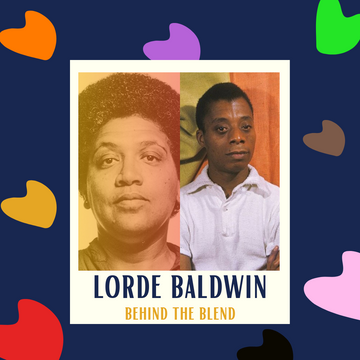Why Lorde Baldwin?
All of our Ezra blends celebrate cultural traditions and commemorate remarkable stories full of historical figures, activists, and events that are integral parts of our collective American history.
Our Lorde Baldwin blend is no different.
Especially during Pride month, we are proud to highlight two activists, writers, and influential members of the LGBTQIA+ community: Audre Lorde and James Baldwin.
Hear more about how our founder developed the name for our boldest and strongest blend.
With expressive notes of dark chocolate, cherry, and aromatic herbs, Lorde Baldwin is a Kenyan AA based blend with sparkling acidity and intense citric flavor.
Much like its namesakes, this blend is bold, powerful, and guaranteed to lead to an awakening.
Behind the Blend
Our Lorde Baldwin blend is a dark roast that honors the literary prowess that two iconic individuals displayed during their fight to combat social inequity.
The Lorde Baldwin blend commemorates and celebrates Audre Lorde and James Baldwin, not only for their way with words but for their commitment to community, to education, and to helping the world.
Their words, their actions, and their careers encompass Ezra and champion its mission.
Audre Lorde: The Woman Behind the Lorde
A self-claimed "black, lesbian, mother, warrior, poet," Audre Lorde dedicated her life, her voice, and her creativity to confronting and combating social and cultural injustices surrounding racism, sexism, classism, and homophobia.
Born and raised in NYC, Lorde's literary career began when she published her first poem in Seventeen magazine while she was still a high school student. Audre used to literally speak in poems. "I literally communicated through poetry," Audre said in a Black Women Writers interview. "And when I couldn't find the poems to express the things I was feeling, that's what started me writing poetry, and that was when I was twelve or thirteen."
Lorde's early poetry collections include The First Cities (1968), Cables to Rage (1970), and From a Land Where Other People Live (1972).
Lorde's poetry was a way to speak truth to power, to speak her truth.
"I have a duty," Lorde once shared, "to speak the truth as I see it and to share not just my triumphs, not just the things that felt good, but the pain, the intense, often unmitigating pain."
Lorde and her work was central to many liberation movements fighting the marginalization of people and categories. Lorde's poetry is known for its powerful call for social and racial justice, as well as its depictions of sexuality, queer experiences, and a focus on intersectionality.
Click here for a full biography of Audre Lorde from the Poetry Foundation.
James Baldwin: The Man Behind the Baldwin
James Baldwin was a novelist, playwright, and essayist who expertly captured American racial strife, giving voice to literarily, socially, and culturally underrepresented groups.
Baldwin's career began during the last years of legislated segregation. While marked signs perpetuating prejudices were still hung on display, Baldwin's descriptive observations of the American social and political structures captured the sentiments of Black America: their aspirations, disappointments, frustrations, coping strategies, and more in a hostile, White American society.
Baldwin's exploration of the psychological implications and subsequent ramifications of racism for both the oppressed and the oppressor made his work a notable tool in the fight for racial and social justice.
Baldwin's bestsellers, such as Nobody Knows My Name: More Notes of a Native Son (1961) and The Fire Next Time (1963) helped relay the sentiments of rising black bitterness through the genre of literary realism.
Baldwin's writing, noted the Washington Post, "became a standard of literary realism... Given the messy nature of racial hatred, of the half-truths, blasphemies, and lies that make up American life, Baldwin's accuracy in reproducing that world stands as a remarkable achievement."
For a full history of Baldwin's life from the Poetry Foundation, click here.






